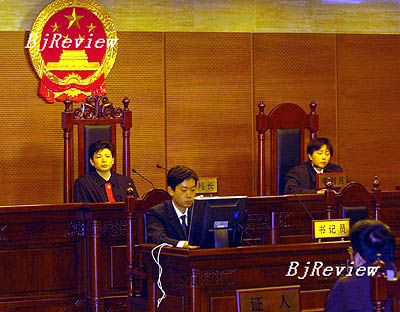|

On February 28, the National People's Congress of China approved the appointment of Wang Tianhai as the Procurator General of Yunnan Provincial People's Procuratorate. Previously, Wang served as Deputy Procurator General of Henan Provincial People's Procuratorate.
Recently, China launched a widespread judicial officer rotation system. Under the system 26 presidents of higher people's courts and procurator generals at the provincial level are selected from provinces other than the one they will serve.
According to the Judges Law and Public Procurators Law, the presidents of higher people's courts and procurator generals at the provincial level are appointed by the provincial people's congresses, while nominations of procurator generals should be approved by the National People's Congress.
From April 2007,relevant government agencies have studied the issue, and solicited public feedback. In August 2007, the government released a circular to "promote the exchange and rotation of presidents of higher people's courts and procurator generals at the provincial level." The circular stipulates that judicial officers who have been in the same post for 10 years or more can no longer be appointed to posts in the same province; and new presidents of higher courts and procurator generals at the provincial level should usually be selected from other provinces. The exchange and rotation system of judicial officers at the county or city levels has been implemented in China for more than a decade.
Key participants in the exchange and rotation system include newly elected judicial officers and officers serving the same jurisdiction for an extended period. The exchanges are between provinces or between the presidents of higher courts and the procurator generals in the same provincial jurisdiction. It is said that all of the 31 newly appointed presidents of provincial higher people's courts hold bachelors or more advanced degrees. Five of them hold a doctor's degree, and 20 either hold a master's degree or have received post-graduate education.
In recent years, several notorious corruption scandals in the judicial system of China have been exposed. These cases involved judicial officers in several provinces, and severely damaged the overall reputation of officers. For instance, from June to October 2006, eight judicial officers in the Intermediary People's Court of Shenzhen City in south China were arrested for involvement of corruption cases. The Intermediary People's Court of Shenzhen City is a forerunner in legal reform. It is shocking to know that such a court is plagued with corruption.
Wang Guixiu, a professor at the Party School of the Central Committee of the CPC discussed the pros and cons of judicial officers serving the same jurisdiction for a long time. On one hand, officers who understand their jurisdictions well can better meet the needs of the local communities; on the other hand, they are more susceptible to the influence of local groups, which could impair their impartiality. Wang recommended careful evaluation of the benefits and costs of the exchange and rotation system. Zhang Jianjun, an official in the Supreme People's Procuratorate of China, shares Wang's opinion. Zhang said, "Those presidents of higher courts and procurator generals who work for a long time at one place might develop close personal relations, which will reduce their ability to implement the law impartially. Rotating officers to different provinces will reduce nepotism and other corruption."
The exchange and rotation system is a significant measure to combat corruption, optimize resources and improve work performance, expressed Zhou Yongkang at a recent conference on this topic. Zhou is a member in charge of legal affairs in the Standing Committee of the Political Bureau of the CPC Central Committee.
"The system, although effective in treating the symptoms of corruption, is not enough to eliminate corruption," Jiang Ming'an, a law professor in Peking University said. To uproot corruption, profound reform of the judicial system is needed. | 